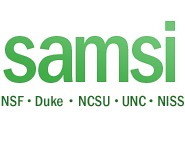2011-12 Education and Outreach Program

Each year SAMSI conducts a variety of education and outreach workshops and activities. Two two-day workshops for undergraduates are held. These workshops are aimed at introducing students to the manner in which statistics and applied mathematics play fundamental roles in science, with a focus on topics related to current SAMSI research programs. Students also gain hands-on experience with some of the technologies and software commonly used by researchers in the field.
In mid-May, SAMSI sponsors a week-long interdisciplinary workshop for undergraduates. This workshop, with approximately 25 rising juniors and seniors chosen from a nationwide pool, provides students with an intensive introduction to research topics which can be furthered by the combined application of statistics and applied mathematics. As part of the workshop, students are divided into teams that, working under the supervision of more experienced researchers, collect and analyze their own physical data. The workshops are aimed at encouraging students to pursue graduate studies in the statistical and mathematical sciences. In parallel with activities aimed at students, about 30 faculty from primarily teaching colleges are invited to SAMSI during that week. The goal of these activities is to allow these faculty members to keep an active connection with current research themes in the mathematical sciences. The research themes studied by the students during the week are used as a vehicle for this. Some of the activities are held with both groups together, but most are conducted separately. It is expected that the faculty will gather material (modules) that they can incorporate into their teaching. Further, the presence of faculty from under- represented schools also encourages the participation of students from those institutions.
Each summer SAMSI sponsors the Industrial Mathematical and Statistical Modeling Workshop (IMSM) for graduate students. The objective of this workshop is to expose graduate students in mathematics, engineering, and statistics to challenging and exciting real-world problems. Students work in teams of five to seven individuals on projects presented by scientists from national laboratories, industry research centers and other non-academic institutions. Students learn to communicate with scientists outside of the student’s discipline, to allocate tasks among team members, and to disseminate results through both oral presentations and written reports. At the end of the workshop, each group presents its results to all participants. Further, each group has to write a technical report. These reports often result in scientific publications.
